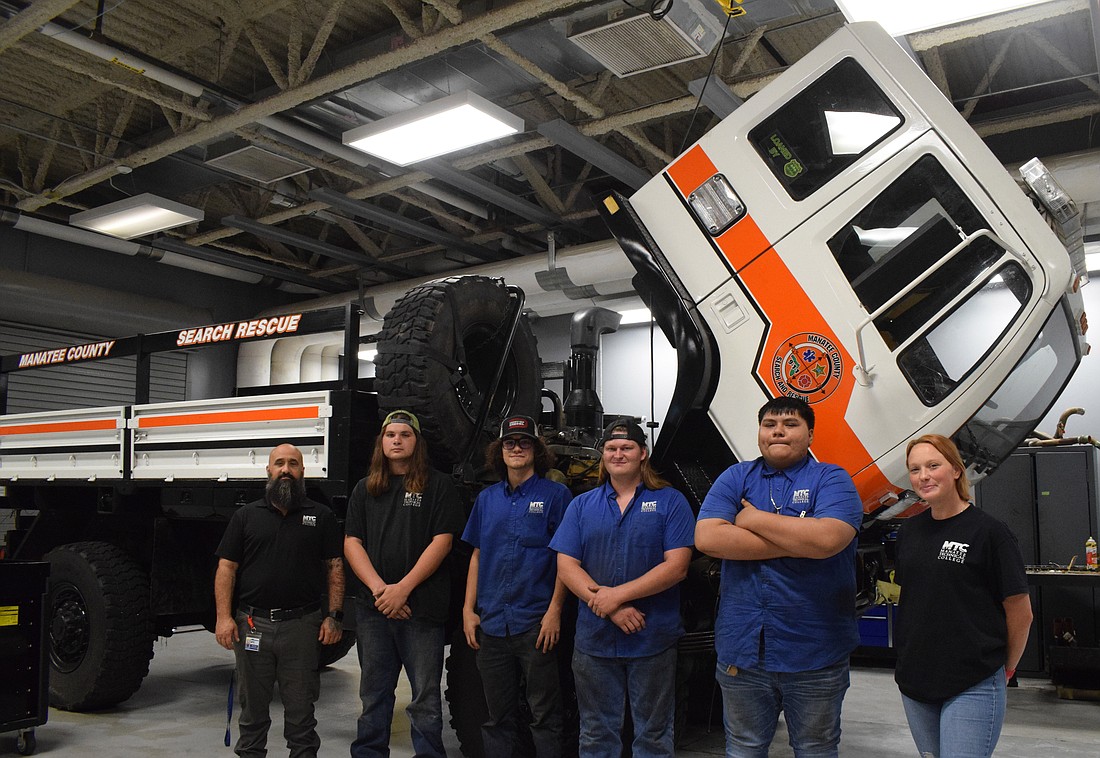- November 19, 2025
-
-
Loading

As a former Army mechanic, Paige Godwin thought enrolling in Manatee Technical College’s new diesel systems technician program would allow her to continue to develop her skills.
However, Godwin was nervous about being one of the first students in a new program. Was it going to be worth the time? She wondered if she would have a job when she graduated from the program.
She didn't have to worry. She began working as a diesel systems technician for Coca Cola before she even had graduated from the program.
Manatee Technical College received a $430,000 Job Growth Grant from the Florida Department of Economic Opportunity to start the diesel systems technician program. The program started in October, producing its first graduates in June.
Ryan Lazarus was one of the first students to enroll in the program after deciding Manatee Technical College’s marine program wasn’t for him.
He said being a part of the first diesel systems technician class has been different. Due to its infancy, the program has made adjustments along the way, has received more equipment, and has developed partnerships with organizations such as Manatee County Search and Rescue.

There were only five students in the program for its first class, but Adam Green, the diesel systems technician program instructor, expects to have at least 15 students when classes start in August.
Green said the program is crucial to addressing the need for diesel mechanics.
“In the last 20 to 30 years, the focus has been on going to college, getting an office job or something like that,” Green said. “All of the trades, across the board, are being undermanned. The knowledge base is retiring and not being replaced. If one day we run out of diesel mechanics, all of America will cease to move. Every facet of your life is supported by a diesel truck and you don’t even realize it. Without these students, it’ll just stop one day, so it’s important that we maintain these trades.”
The program begins with diesel engine theory and transportation logistics before moving onto the hands-on work with diesel equipment.
Students worked on trucks for Manatee County Search and Rescue, providing them real-life, hands-on experience. For example, students repaired a U.S. Army-made light medium tactical vehicle, dissecting the engine and putting it back together, Green said.
“(The students are) have a unique opportunity of working on active duty emergency services vehicles just about every day,” Green said. “We get new stuff in from them every day, fix it and send it back out to work. Being able to impact the community in a positive way and watch the students grow into professional diesel mechanics has been pretty awesome.”
Godwin enjoyed working on search and rescue’s Humvee because it’s a vehicle she repaired several times while serving in the military. She could replace the shafts, brakes, rotors, hubs and more in no time.
“It was easy for me,” she said. “I got it done quick and easy. The Humvee was my baby. That’s literally what the search and rescue guys call it. They’d say, ‘That’s her baby.’”

Lazarus said the experience was cool but also slightly frightening, knowing a mistake fixing a problem with the trucks could result in the loss of life.
“You have to be vigilant,” he said. “You have to care and watch what you do and how you do it. You have to make sure everything’s right.”
Weeks before the students finished the program, each had already received job offers from multiple companies.
“Ever since month one, employers have been here, visiting and talking about what they do and selling their benefits packages, compensation and everything,” Green said. “After a while, employers began bidding against each other for their services.”
Green said he was amazed to see so many employers recruiting his students. He recalled when he was looking for a job as a mechanic in the early 2000s and struggled to be interviewed.
Once the students completed 75% of the program, they were able to start working full time.
Students in the diesel program also saw success at the SkillsUSA competition where they competed at the state level with only six months of training under their belts. The students walked away with a silver medal.
“We were competing against other schools that have two-year programs and their students have been in their programs for 16 to 18 months,” Green said. “That’s pretty good. It says something about the students and the program we’re developing here.”